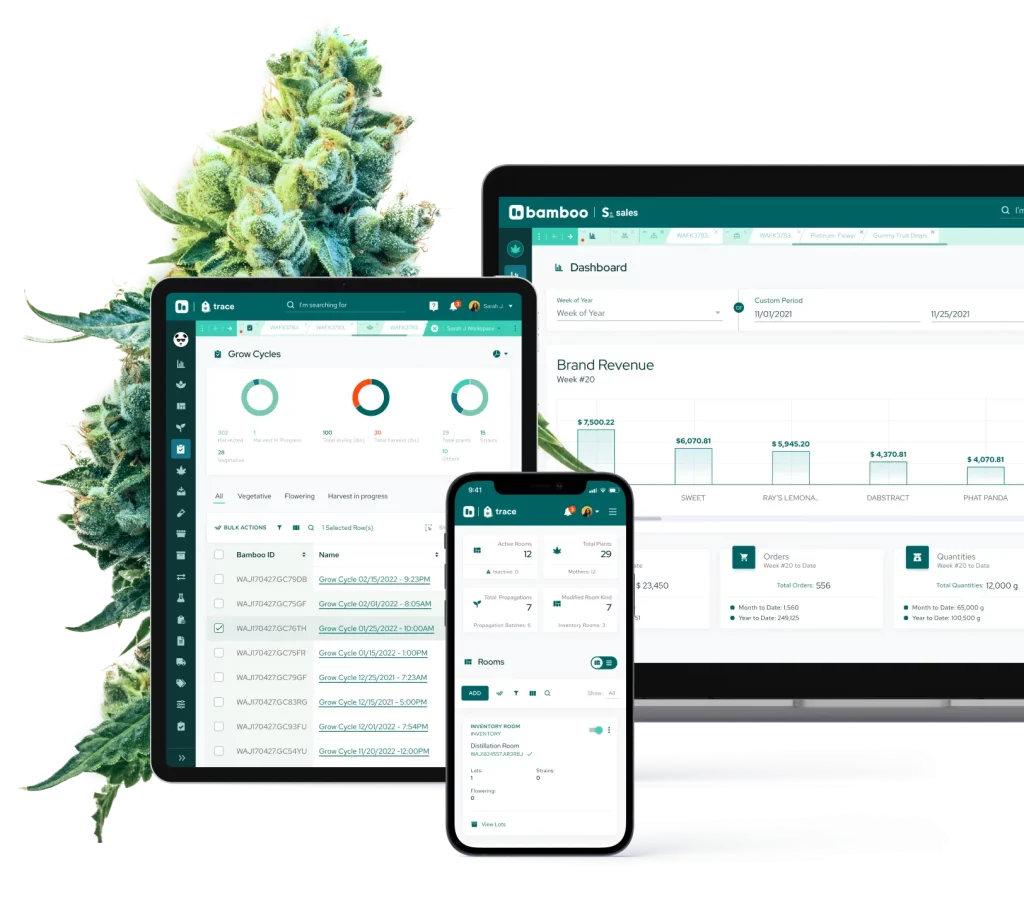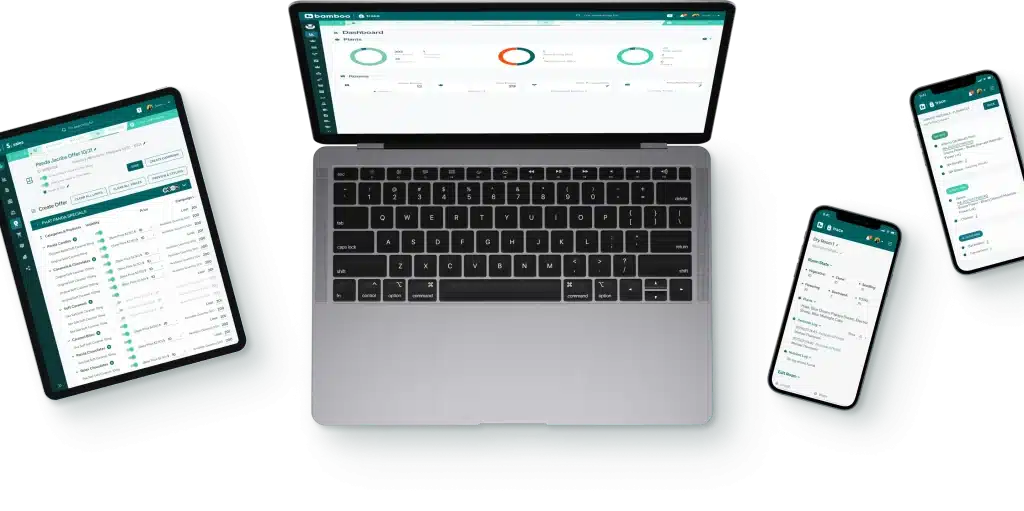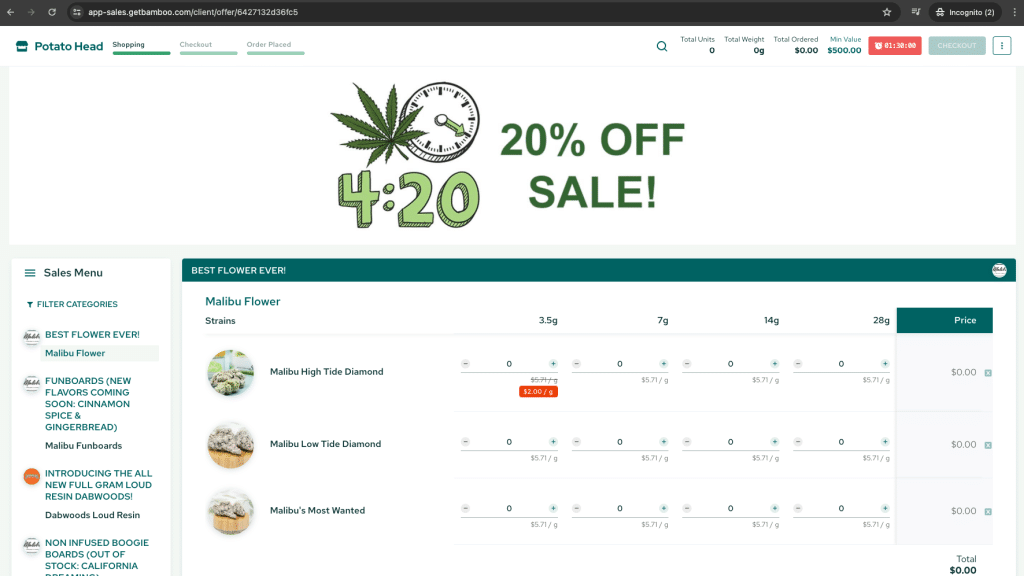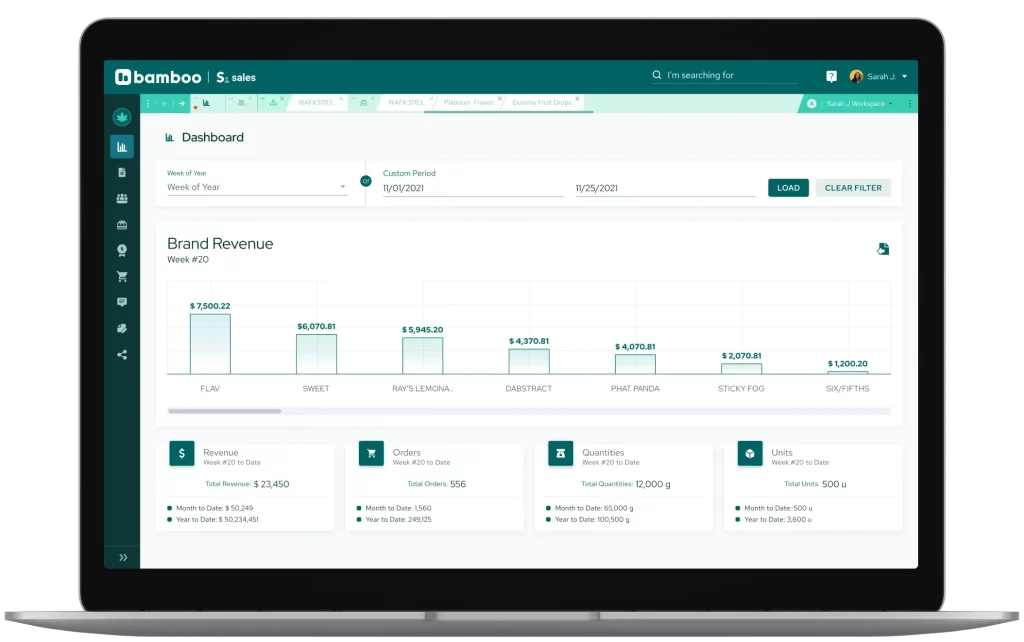Alaska Seed to Sale Cannabis Software
Bamboo provides customized software solutions tailored to Alaska’s cannabis industry, aiding businesses in streamlining operations, improving traceability, and optimizing sales strategies.
With Bamboo Sales and Trace, Alaska’s cannabis enterprises effectively manage inventory, ensure compliance with state regulations, and capitalize on revenue opportunities. Featuring live inventory tracking, customizable sales interfaces, and integrated compliance tools, Bamboo empowers cannabis businesses to flourish and grow in Alaska’s ever-evolving cannabis sector.

Alaska's Recreational Market
Alaska’s recreational cannabis market has experienced steady growth and maturation. Here’s an overview of some key developments:
- Sales and revenue:
- According to the Alaska Department of Revenue, total cannabis sales for the 2023 calendar year reached approximately $350 million, a 10% increase from the previous year.
- The state collected around $35 million in cannabis tax revenue, which is allocated to various programs, including education, public health, and law enforcement.
- Market trends:
- The COVID-19 pandemic continued to impact the market, with a shift towards online ordering and curbside pickup.
- Edibles and concentrates gained market share, while flower sales remained the largest product category.
- Prices remained relatively stable, with some fluctuations based on supply and demand dynamics.
- Regulatory changes:
- In late 2023, the Alaska Marijuana Control Board updated its regulations to allow for home delivery of cannabis products, subject to local approval and strict safety protocols.
- The state also implemented new testing requirements for heavy metals and pesticides to enhance product safety.
- Industry developments:
- Several new cannabis businesses opened, particularly in rural areas that were previously underserved.
- Some consolidation occurred, with larger companies acquiring smaller operators to gain market share and achieve economies of scale.
- The state issued additional licenses for on-site consumption lounges, allowing for a new type of cannabis tourism experience.
- Social equity:
- The state continued to implement its social equity program, which provides support and resources for individuals from communities disproportionately impacted by cannabis prohibition.
- This included grants for business development, training programs, and expungement clinics for past cannabis convictions.
- Challenges:
- The industry faced some supply chain disruptions due to the ongoing effects of the pandemic and transportation issues.
- The illicit market remained a concern, with the state increasing enforcement efforts to combat unlicensed businesses and diversion.
Overall, Alaska’s recreational cannabis market continued to grow and evolve, with increasing sales, new product trends, and regulatory updates. The state remains committed to maintaining a well-regulated and safe industry that generates revenue and promotes social equity. However, challenges such as the illicit market and supply chain disruptions persist and will require ongoing attention from regulators and industry stakeholders.
Alaska's Road to Recreational Cannabis
Alaska’s road to legalizing recreational cannabis was marked by a series of legislative efforts and a successful ballot initiative. Here’s a timeline of the key events:
- 1975: Alaska became one of the first states to decriminalize cannabis possession, following a landmark Alaska Supreme Court case (Ravin v. State) that established the right to privacy for personal cannabis use in the home.
- 1990: Voters approved Measure 2, which recriminalized cannabis possession, overturning the 1975 court decision.
- 1998: Voters approved Ballot Measure 8, legalizing medical cannabis for patients with certain qualifying conditions.
- 2000-2014: The state’s medical cannabis program remained largely unregulated, with no formal patient registry or licensed dispensaries.
- 2014: The Campaign to Regulate Marijuana Like Alcohol in Alaska successfully gathered enough signatures to place Ballot Measure 2 on the November ballot.
- November 2014: Alaska voters approved Ballot Measure 2 with 53.2% of the vote, legalizing the possession, consumption, and cultivation of cannabis for adults 21 and older.
- February 2015: Provisions of Ballot Measure 2 allowing adults 21 and older to possess up to one ounce of cannabis and to cultivate up to six plants at home took effect.
- 2015-2016:
- The Alaska Legislature passed several bills to establish a regulatory framework for the adult-use cannabis industry, including licensing requirements, taxation, and product safety standards.
- The Alaska Marijuana Control Board, tasked with regulating the industry, began developing rules and procedures for licensing cannabis businesses.
- October 2016: The first licensed recreational cannabis retail stores opened in Alaska, marking the beginning of legal adult-use sales.
- 2016-2023:
- Alaska’s adult-use cannabis market has continued to develop, with the state refining its regulations to address industry needs and public health concerns.
- The state has implemented various measures to promote public safety and prevent youth access, such as packaging and labeling requirements, advertising restrictions, and product potency limits.
- Cannabis tax revenue has been allocated to education, drug treatment, and law enforcement programs.
Alaska’s legalization of recreational cannabis has been influenced by the state’s long history of personal cannabis use rights and its experience with an unregulated medical cannabis program. The state’s successful implementation of an adult-use industry has demonstrated the potential for a regulated market to generate tax revenue, create jobs, and promote public health and safety in a largely rural and geographically diverse state. As the legal cannabis landscape continues to evolve, Alaska’s approach to regulation and its management of unique challenges, such as limited infrastructure and remote communities, may offer valuable insights for other states considering legalization.
Traceability, Compliance & Regulation in Alaska
Alaska was one of the earlier states to legalize recreational cannabis after voters approved an initiative in 2014. The Alaska Marijuana Control Board was established to regulate the legal cannabis industry in the state.
Metrc (Marijuana Enforcement Tracking Reporting Compliance) is the seed-to-sale tracking system mandated by the Alaska Marijuana Control Board for all licensed cannabis cultivators, manufacturers, retailers, and testing facilities.
Some key points about Alaska’s use of Metrc:
✔ Metrc tracks cannabis plants and products from immature plant stage all the way through growth cycles, processing, testing, transportation and final sale to consumers.
✔ All cannabis establishments must use Metrc to record every step in the process and every transfer of products between licensed facilities.
✔ This allows the state to monitor and enforce compliance with regulations on inventory, prevention of diversion to the illegal market, product testing requirements, and collection of taxes.
Licensees must record detailed data into Metrc including plant/product weights, testing results, transportation manifests, and sales transaction data.
Metrc utilizes RFID tagging of plants and package labels to enable traceability throughout the supply chain.
In Alaska, recreational cannabis is legal and regulated by the state government. The Alaska Marijuana Control Board (AMCO) is responsible for overseeing the licensing, regulation, and enforcement of the cannabis industry. Here are the key aspects of recreational cannabis traceability, compliance, and regulation in Alaska:
- Seed-to-Sale Tracking:
- Alaska uses the Metrc system for seed-to-sale tracking of cannabis plants and products.
- All licensed cannabis businesses, including cultivators, manufacturers, and retailers, must use Metrc to track the movement of cannabis from seed to final sale.
- Each plant is assigned a unique identifier tag, and all products derived from that plant are tracked throughout the supply chain.
- Licensing and Permits:
- The AMCO issues licenses for cannabis businesses, including cultivation facilities, product manufacturing facilities, testing facilities, and retail stores.
- License applicants must meet certain requirements, such as being at least 21 years old, having no felony convictions in the past five years, and being an Alaska resident.
- Local governments have the authority to ban or restrict cannabis businesses within their jurisdiction.
- Inventory Tracking and Reporting:
- Licensed cannabis businesses must maintain accurate inventory records and report their inventory to the AMCO through Metrc.
- This includes tracking the quantity of cannabis plants, harvested materials, and finished products at each stage of the supply chain.
- Businesses must also report any discrepancies, losses, or diversions of inventory to the AMCO.
- Testing and Labeling:
- All cannabis products must be tested by a licensed testing facility for potency, contaminants, and other quality control measures before being sold to consumers.
- Products must be labeled with accurate information about their contents, potency, and any required warnings or disclosures.
- Security and Surveillance:
- Cannabis businesses must implement security measures, including video surveillance, alarm systems, and restricted access areas.
- These measures help prevent theft, diversion, and unauthorized access to cannabis products.
- Packaging and Advertising Restrictions:
- Alaska has specific requirements for the packaging and labeling of cannabis products to ensure they are not attractive to children and do not make false or misleading claims.
- Advertising and marketing of cannabis products are also regulated to prevent targeting underage individuals and to promote responsible consumption.
- Inspections and Enforcement:
- The AMCO conducts inspections of licensed cannabis businesses to ensure compliance with all applicable laws and regulations.
- Violations can result in fines, license suspensions, or revocations, depending on the severity and frequency of the infraction.
- Taxation and Revenue Tracking:
- Alaska imposes an excise tax on the sale of cannabis from cultivation facilities to manufacturers or retailers.
- Businesses must accurately track and report their sales and tax liabilities to the Alaska Department of Revenue.
These regulations aim to ensure the safety, quality, and accountability of the recreational cannabis industry in Alaska while preventing diversion to the illicit market and protecting public health and safety. Businesses operating in the cannabis industry must stay informed about any changes or updates to these regulations to maintain compliance.
Why Bamboo for Alaska?
Are you ready to stand out from the crowd of Leaflink, Distru, and other marketplace users? Introducing Bamboo, your all-encompassing solution. With seamless Metrc integration, Bamboo offers a hassle-free two-way sync, making traceability and product labeling a breeze. Even better, Bamboo Trace comes at no extra cost for all Alaska Metrc users, ensuring smooth and effortless traceability alongside integrated Bamboo Sales.
Businesses are increasingly embracing Bamboo’s proactive sales strategies. Envision user-friendly menus for quick ordering on any device. Our sales menu website integration is simple to set up and can even boost your revenue. Plus, Bamboo’s nifty feature allows you to create as many proposal orders as needed, making life easier for your buyers. With Bamboo Sales, you’ll also gain access to powerful data analytics with customizable reporting and much more!
Ready to revolutionize your operations? It’s time to make the switch to Bamboo.
Bamboo Trace
✔ Quick-action buttons available in every module for swift navigation and action execution.
✔ Simplified traceability through real-time two-way synchronization with Alaska’s seed-to-sale system (Metrc).
✔ Receive instant notifications for important updates and events.
✔ Work in offline mode, accessible on both mobile and desktop devices, especially useful during periods of downtime in Metrc API systems.
✔ Ability to support multiple licenses for comprehensive management of operations.
✔ Customize label templates to meet Alaska’s Metrc regulations and efficiently generate multiple labels for various plant and product requirements.
✔ Comprehensive management of Strains, Rooms, Propagations, Grow Cycles, Plants, Harvests, Disposals, Inventories, Conversions, QA Samples, and more, all integrated within Bamboo Trace.
✔ Effortlessly process orders and generate manifests in just minutes for enhanced efficiency.

Bamboo Sales
✔ Utilize the finest Sales Menus available in Cannatech for enhanced sales strategies.
✔ Seamlessly integrate Sales Menus with your website for expanded reach and accessibility.
✔ Simplify email marketing efforts with the built-in feature tailored for sending sales menus effortlessly.
✔ Gain insights through comprehensive sales analytics and reporting on clients, sales reps, and customizable metrics.
✔ Generate numerous recommended orders (proposals) to cater to diverse client needs.
✔ Customize Real-time Sales Menus according to preferences and branding.
✔ Easily manage discounts, credits, pricing tiers, and distribution lists for streamlined operations.
✔ Efficiently handle all your sales enablement strategies within the Bamboo Sales platform.

